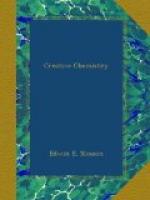Shakespeare in the passage quoted is indulging in his favorite amusement of a play upon words. There is a possible and a proper sense of the word “nature” that makes it include everything except the supernatural. Therefore man and all his works belong to the realm of nature. A tenement house in this sense is as “natural” as a bird’s nest, a peapod or a crystal.
But such a wide extension of the term destroys its distinctive value. It is more convenient and quite as correct to use “nature” as I have used it, in contradistinction to “art,” meaning by the former the products of the mineral, vegetable and animal kingdoms, excluding the designs, inventions and constructions of man which we call “art.”
We cannot, in a general and abstract fashion, say which is superior, art or nature, because it all depends on the point of view. The worm loves a rotten log into which he can bore. Man prefers a steel cabinet into which the worm cannot bore. If man cannot improve Upon nature he has no motive for making anything. Artificial products are therefore superior to natural products as measured by man’s convenience, otherwise they would have no reason for existence.
Science and Christianity are at one in abhorring the natural man and calling upon the civilized man to fight and subdue him. The conquest of nature, not the imitation of nature, is the whole duty of man. Metchnikoff and St. Paul unite in criticizing the body we were born with. St. Augustine and Huxley are in agreement as to the eternal conflict between man and nature. In his Romanes lecture on “Evolution and Ethics” Huxley said: “The ethical progress of society depends, not on imitating the cosmic process, still less on running away from it, but on combating it,” and again: “The history of civilization details the steps by which man has succeeded in building up an artificial world within the cosmos.”
There speaks the true evolutionist, whose one desire is to get away from nature as fast and far as possible. Imitate Nature? Yes, when we cannot improve upon her. Admire Nature? Possibly, but be not blinded to her defects. Learn from Nature? We should sit humbly at her feet until we can stand erect and go our own way. Love Nature? Never! She is our treacherous and unsleeping foe, ever to be feared and watched and circumvented, for at any moment and in spite of all our vigilance she may wipe out the human race by famine, pestilence or earthquake and within a few centuries obliterate every trace of its achievement. The wild beasts that man has kept at bay for a few centuries will in the end invade his palaces: the moss will envelop his walls and the lichen disrupt them. The clam may survive man by as many millennia as it preceded him. In the ultimate devolution of the world animal life will disappear before vegetable, the higher plants will be killed off before the lower, and finally the three kingdoms of nature will be reduced to one, the




